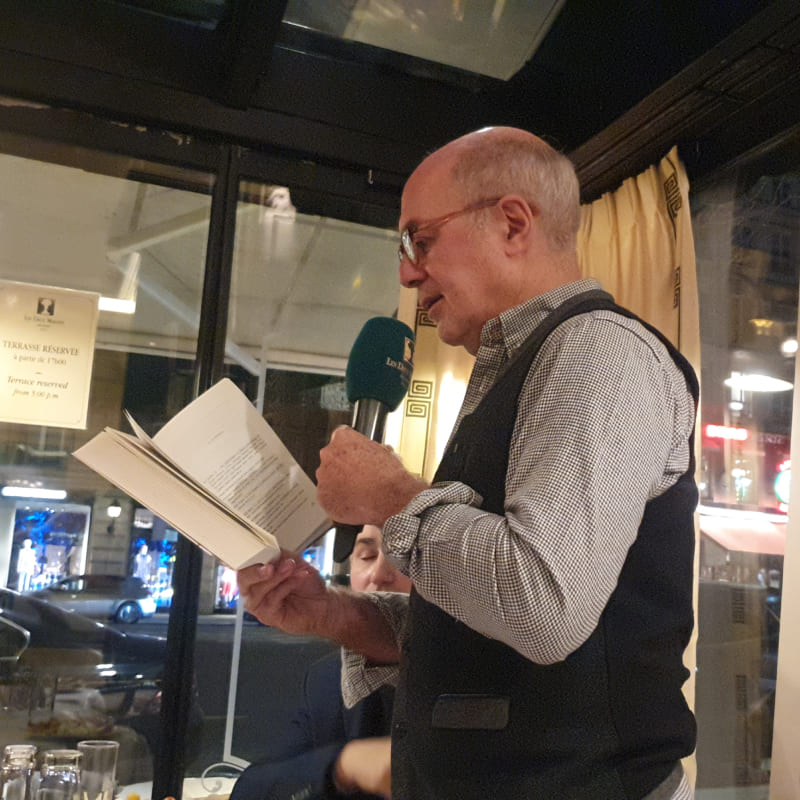Writers' Monday with Pierre Assouline
Novelist, biographer, journalist, professor of literature at Sciences Po, member of the Académie Goncourt… Pierre Assouline is “the man of letters par excellence” as Baptiste Liger rightly put it.
This taste for literature in all its forms is perfectly reflected in his new work, mixing history with fiction, and biography with poetry.

Pierre Assouline is not one of those writers who fell in love with books at an early age. He liked to read Jules Verne or Stevenson like so many other children, period. His first real passion was History, his burning desire to be a journalist, and it is through these two poles of attraction that literature came into his life, in a second time.
Realizing that the newspapers that employed him could no longer really afford to finance large-format reports, Pierre Assouline began to write journalistic books. It is only from his fifteenth book that he accepted the mention “writer” on the back cover, as for him this term referred to pure fiction and not to his own work.
It is with Lutétia in 2005, or later with Sigmaringen, that he believes he has found the literary form in which he thrives the most: to seize a historical event, then, from an investigation based on real facts, to graft his own fictional staging onto it.
In “Thou shalt be a man, my son”, we witness the birth of a friendship between the real Rudyard Kipling and the fictional narrator Louis Lambert, a young teacher who is engaged in the translation of Kipling’s famous poem which gives the novel its title.
Rudyard Kipling was, rarely, rich by his writing, and adored very young by glorious elders like Henry James and Conan Doyle. He wrote few novels apart from the cultish The Jungle Book, but was an excellent writer of short stories and a great poet in a nation that worships poetry. His tumultuous personality, on the other hand, is highly divisive in the UK. The man was indeed ultra-conservative, a convinced colonialist, and willingly xenophobic, especially towards the Germans.
The matrix work, the one that gave Pierre Assouline the idea for his novel, is the famous poem “If”written in 1910 and translated into French under the title “You will be a man, my son. Inspired by his encounter with a man who raised an army during the Boer War in South Africa, the work became popular in a flash, and hung over the beds of many generations of children. “If is a poem that has guided lives,” summarizes our guest.
The crux of Pierre Assouline’s novel is this question: To what extent are parents responsible for the destiny of their children? Kipling was indeed a very complicated father, who undeniably loved his three children, but who can be considered responsible for the death of two of them.
The novel deals particularly with the case of John Kipling, a lovely boy but neither bright nor strong enough for the military career that his father intended for him, obviously in order to live it by proxy. The young man had a lot of trouble with his famous surname, and had to live with paternal shame after being discharged from the army in 1914 because of his strong myopia. Their stormy and misunderstood relationship ended in tragedy, as Rudyard Kipling managed to send his son to the trenches, where he died. This father, so severe, who loved his children but did not love them well, sank into a guilt-ridden denial that lasted for two years, and then later insisted on digging up the no-man’s-land of the battlefield in order to find a trace, however small, of his son. He did not succeed.
Then comes all the talent of our guest to interweave the real life of Rudyard Kipling, made of glories but also of great family sorrows, and the novel under the features of this fictional young French teacher, so perfectionist that he took thirty years to realize his translation of “If”. Pierre Assouline then invents a complex, very strong, almost filial friendship between the great man who was wounded and this Louis Lambert who venerates the author Kipling while not being blind to the darker aspects of his personality.
Pierre Assouline’s erudition, coupled with his communicative love for History and books, made this meeting a very pleasant moment of literary sharing.